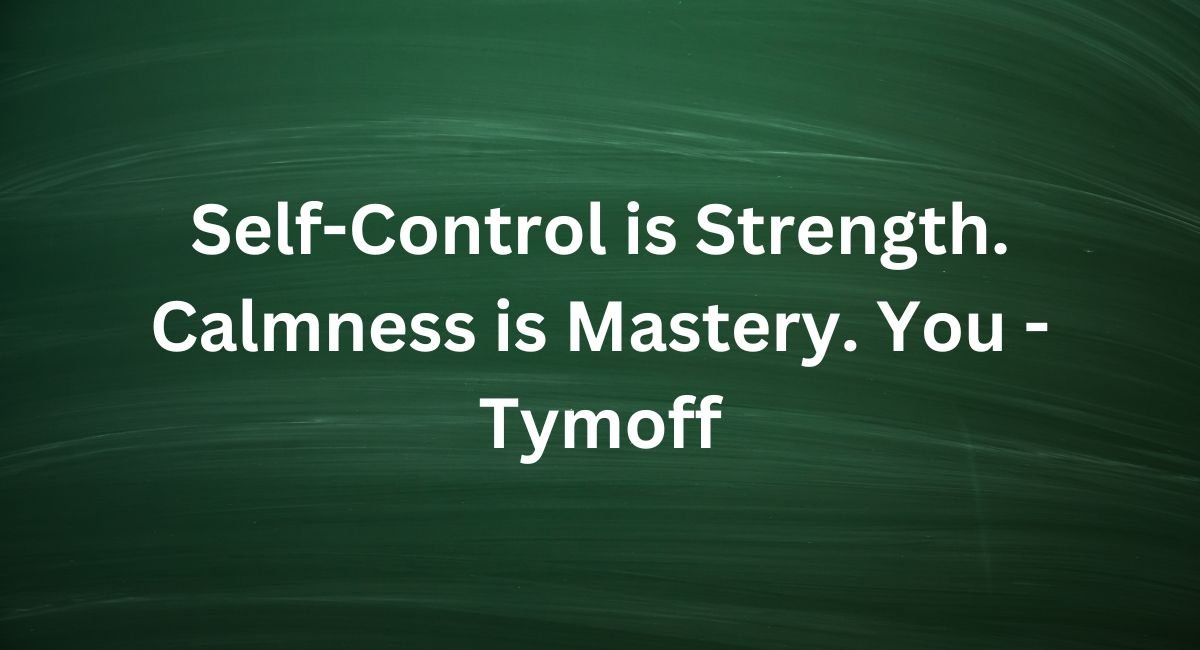
Self-Control is Strength. Calmness is Mastery. You – Tymoff
Do you ever feel like your emotions are running the show, leaving you feeling overwhelmed and out of control? It’s time to tap into your inner strength and master the art of calmness. In this blog post, we will explore how self-control is a powerful tool for personal growth and why mastering calmness can lead to true mastery in all aspects of life. Get ready to unleash your full potential with Self-Control is Strength. Calmness is Mastery. You – Tymoff!
Introduction to Self-Control is Strength. Calmness is Mastery. You – Tymoff
Self-control and calmness are two powerful inner qualities that can greatly impact our daily lives. They are often seen as desirable traits, but what exactly do they mean? In this section, we will delve deeper into the concepts of self-control and calmness to gain a better understanding of how they can benefit us.
Self-control is commonly defined as the ability to control one’s thoughts, emotions, and behaviors in a way that aligns with their long-term goals and values. It involves being able to resist temptations and impulses in order to make rational decisions. Self-control is not about suppressing our desires or denying ourselves pleasure; it is about having discipline and managing our impulses in a healthy way.
On the other hand, calmness refers to a state of mental tranquility and composure. It is the ability to remain composed even when faced with challenging situations or external stressors. Calmness allows us to stay level-headed and think more clearly, leading to better decision-making.
Both self-control and calmness are closely intertwined. Having self-control enables us to maintain our calmness in difficult situations, while being calm helps us exercise better self-control by preventing impulsive reactions.
So why are these qualities important? The truth is, life is full of challenges that can test our patience, resilience, and determination. Without self-control and calmness, we may find ourselves easily succumbing to distractions or reacting impulsively out of frustration or anger. This can lead to poor decision-making or regrettable actions that could have been avoided if we had exercised more control over our thoughts and emotions.
In contrast, having strong self-control allows us to stay focused on achieving our goals despite any obstacles we may face along the way. It also allows us to handle difficult situations calmly without giving in to negative emotions such as fear or anger.
Moreover, both self-control and calmness play a crucial role in our overall well-being. They can help us manage stress, improve our relationships with others, and boost our self-esteem. When we are in control of our thoughts and emotions, we feel more empowered and confident in ourselves.
In the following sections of this article, we will discuss practical strategies for developing self-control and calmness in order to lead a more fulfilling and successful life. Remember, self-control is strength, but calmness is mastery – let’s strive to achieve both together.
Read Also: Love What You Have, Before Life Teaches You To Lov – Tymoff
The Importance of Self-Control:
Self-control is the ability to regulate one’s thoughts, emotions, and behaviors in order to achieve a desired outcome. It is an essential aspect of personal growth and development, as it allows individuals to make conscious decisions rather than reacting impulsively. In today’s fast-paced world, where instant gratification is often prioritized over long-term goals, having self-control has become increasingly important.
One of the main reasons why self-control is so crucial is because it helps individuals build resilience and cope with difficult situations. Life can often throw unexpected challenges our way, and without self-control, we may find ourselves succumbing to impulsive reactions that only worsen the situation. On the other hand, those who possess a strong sense of self-control are better equipped to handle stress and navigate through tough times with grace.
Moreover, self-control plays a significant role in achieving success in various aspects of life. Whether it be in academics, career, or relationships – having the ability to resist temptations and stay focused on long-term goals is key. Procrastination and indulgence in immediate pleasures are common obstacles that hinder progress towards success. However, by exercising self-discipline and practicing self-control, individuals can overcome these challenges and work towards achieving their aspirations.
In addition to external achievements, having self-control also leads to inner peace and contentment. When we have control over our impulses and actions, we feel more confident in our abilities. This confidence translates into a greater sense of self-worth and satisfaction with our lives. Furthermore, practicing self-control can also lead to improved mental health as it allows us to avoid harmful habits or addictions that could negatively impact our well-being.
How self-control leads to success in various aspects of life
Self-control is a fundamental aspect of personal development that plays a crucial role in achieving success in various aspects of life. It refers to the ability to resist impulsive actions and make conscious decisions despite experiencing strong emotions or external temptations. This trait allows individuals to govern their behavior, thoughts, and emotions effectively, leading them towards positive outcomes.
In today’s fast-paced world, where instant gratification is highly valued, self-control has become more critical than ever before. People who possess this quality have a better chance of achieving success in their personal and professional lives. Here are some ways in which self-control leads to success:
1) Better decision-making: Self-control enables individuals to think rationally and make well-informed decisions instead of giving in to impulsive reactions. This helps them avoid making hasty choices that can have negative consequences in the long run. With improved decision-making skills, one can navigate through life’s challenges with ease and achieve their goals efficiently.
2) Increased productivity: The ability to control one’s actions and prioritize tasks leads to increased productivity. People with self-control tend to focus on important tasks rather than getting distracted by minor things. They are disciplined in managing their time and energy, allowing them to accomplish more within a given timeframe.
3) Improved relationships: Self-control also extends to how individuals interact with others. When faced with conflicts or disagreements, people with this trait remain calm and handle the situation maturely without losing their temper or saying hurtful things they may regret later on. This helps build stronger relationships based on trust and mutual respect.
4) Healthier habits: Self-control plays an essential role in maintaining healthy habits such as eating well, exercising regularly, getting enough rest, etc. People who exercise self-control are less likely to give in to unhealthy impulses like binge-eating or excessive drinking that can harm their physical health.
5) Resilience: One of the defining qualities of successful individuals is their resilience. Self-control enables people to develop this quality by helping them stay focused and motivated even in the face of challenges. They can persevere through difficult times, bounce back from failures, and keep working towards their goals.
Self-control is a powerful tool that can help individuals achieve success in all areas of life. It requires practice and discipline, but the rewards are worth it. By cultivating self-control, one can make better decisions, improve productivity, build stronger relationships, maintain healthy habits and develop resilience – all essential ingredients for a successful and fulfilling life.
Read Also: Learn To Sit Back And Observe. Not Everything Need – Tymoff
Examples of successful individuals who have mastered self-control
Self-control is a crucial trait that can lead to success in both personal and professional aspects of life. It requires discipline, determination, and the ability to resist temptations or impulses. While mastering self-control may seem like a daunting task, there are numerous successful individuals who have proven that it is possible.
One example of a successful individual who has mastered self-control is Warren Buffett. He is known as one of the most successful investors in the world, with a net worth of over $100 billion. Despite his immense wealth and access to luxurious indulgences, Buffett leads a simple lifestyle and remains disciplined when it comes to managing his finances. He famously said, “Do not save what is left after spending; instead spend what is left after saving.” This quote highlights his ability to exercise self-control when it comes to money management.
Another example is Oprah Winfrey, one of the most influential media moguls in the world. Despite facing numerous challenges throughout her childhood and early career, Winfrey remained determined and focused on achieving her goals. She credits her success to her ability to control her emotions and remain calm under pressure. This allowed her to make wise decisions even in difficult situations.
An athlete who has mastered self-control is Cristiano Ronaldo, one of the greatest soccer players in history. Apart from being physically fit and talented, Ronaldo also possesses exceptional mental strength through his ability to control his emotions on the field. He remains calm and composed even during high-pressure games, which allows him to make rational decisions and perform at his best.
In addition to these examples from various industries, there are also many successful entrepreneurs who have mastered self-control in their business ventures. One such individual is Elon Musk, CEO of SpaceX and Tesla Motors. His relentless drive for innovation could not have been possible without strong self-discipline and control over his actions and thoughts.
These individuals demonstrate that mastering self-control can lead to incredible achievements in different areas of life. It is not limited to just financial success or professional achievements, but it also contributes to personal growth and overall well-being.
Self-control is a key strength that can lead to mastery in life. The examples of successful individuals who have mastered self-control serve as inspiration for others to develop this crucial trait. With determination, discipline, and the ability to remain calm under pressure, anyone can harness the power of self-control and achieve their goals.
The Power of Calmness:
In today’s fast-paced and high-stress world, it can be challenging to maintain a sense of calmness. We are constantly bombarded with distractions and demands, making it difficult to find a moment of peace. However, cultivating a state of calmness within ourselves can have powerful effects on our overall well-being and success in life.
Calmness is not just about being relaxed or free from stress; it goes much deeper than that. It is an inner state of serenity and stillness that allows us to approach situations with clarity and composure. When we are calm, we are better able to handle challenges, make rational decisions, and communicate effectively with others.
One of the main reasons why calmness holds such power is because it enables us to have self-control. When we are in a state of chaos or agitation, we tend to react impulsively without thinking things through. This often leads to regrets and consequences that could have been avoided if we were calmer. On the other hand, when we are calm, we can pause and assess the situation before responding appropriately. This self-control not only helps us avoid unnecessary conflicts but also allows us to manage our emotions effectively.
Moreover, being calm also allows us to think more clearly and creatively. Our minds are not clouded by fear or anger when we are in a state of tranquility; hence, our thoughts become more organized and focused. As a result, we can come up with innovative solutions to problems instead of getting stuck in negative thought patterns.
Another significant benefit of cultivating calmness is its impact on our physical health. Studies have shown that chronic stress can lead to various health issues such as high blood pressure, heart disease, and weakened immune system. By practicing techniques like deep breathing exercises or mindfulness meditation regularly, we can reduce stress levels and promote relaxation within our bodies.
Lastly but certainly not leastly , mastering the power of calmness can greatly enhance our relationships with others. When we are calm, we are less likely to be reactive or defensive in conflicts, and we can communicate with more empathy and understanding. This not only improves the quality of our relationships but also creates a positive ripple effect in our interactions with others.
The power of calmness should not be underestimated. It is a vital skill that allows us to have self-control, think clearly, improve our physical health, and strengthen our relationships. By prioritizing moments of stillness and tranquility in our daily lives, we can achieve mastery over ourselves and ultimately lead happier and more fulfilling lives.
Read Also: The 1982 Movie Poltergeist Used Real Skeletons As – Tymoff
How being calm helps in managing stress and emotions
Being calm is often seen as a sign of weakness or indifference, but in reality, it is a powerful tool for managing stress and emotions. In today’s fast-paced world, where we are constantly bombarded with information and facing high levels of pressure and expectations, being able to maintain a sense of calm can be the key to achieving inner peace and balance.
One of the main benefits of being calm is its ability to help us manage stress. When faced with a stressful situation, our body triggers the fight-or-flight response, releasing cortisol and adrenaline into our system. This physiological response increases heart rate, blood pressure, and energy levels in preparation for dealing with perceived danger. While this reaction may be useful in certain life-threatening situations, it can also have negative effects on our health when experienced frequently.
On the other hand, staying calm in stressful situations allows us to better regulate our emotions and approach challenges with a clear mind. By remaining composed and focused instead of giving in to panic or anxiety, we can think more rationally and come up with effective solutions. This not only helps us tackle the immediate issue at hand but also prevents long-term consequences such as burnout or chronic stress.
Moreover, practicing calmness can also greatly improve our emotional well-being. It allows us to detach ourselves from external circumstances that may trigger negative emotions such as anger or frustration. Instead of reacting impulsively out of these feelings, we can choose how we respond by staying composed and thinking before acting. This level-headedness enables us to handle difficult situations with maturity and composure rather than letting them dictate our behavior.
Furthermore, being calm helps us cultivate self-control over our thoughts and actions. It teaches us how to manage impulses and avoid impulsive behavior that may lead to regrettable decisions or harmful habits. By taking control over our reactions instead of allowing them to control us, we become more mindful individuals who are aware of their emotions without letting them overpower us.
Being calm is not a sign of weakness but rather a sign of strength and mastery over one’s emotions. It allows us to better manage stress, improve our emotional well-being, and cultivate self-control. So the next time you find yourself in a challenging situation, take a deep breath, stay calm, and approach it with a clear mind – for as the saying goes: “self-control is strength, calmness is mastery.”
Benefits of having a calm demeanor
Having a calm demeanor is often associated with being in control of one’s emotions and actions. It goes beyond just appearing composed on the outside, but also encompasses a state of mind that can greatly benefit an individual in various aspects of life. In this section, we will explore some of the key benefits of having a calm demeanor.
- Better decision-making
One of the biggest advantages of maintaining a calm demeanor is the ability to make sound decisions even in high-pressure situations. When you are able to keep your cool and think logically, you are less likely to be swayed by impulsive or emotional reactions. This can lead to more rational and effective decision-making. - Improved communication
In heated or tense situations, people tend to become defensive or aggressive in their communication styles. However, those with a calm demeanor have better control over their words and tone, allowing them to effectively convey their message without causing conflict. This can help build stronger relationships and avoid unnecessary misunderstandings. - Reduced stress and anxiety
Being constantly overwhelmed by stress and anxiety can take a toll on both our physical and mental well-being. By cultivating a calm demeanor, we learn how to manage our thoughts and emotions better, leading to reduced levels of stress and anxiety. This allows us to approach challenging situations with more clarity and composure. - Increased empathy
When we are able to regulate our own emotions, it becomes easier for us to understand others’ perspectives as well. Having a calm demeanor enables us to listen attentively without passing judgment or reacting impulsively based on our own emotions. This leads to improved relationships as others feel heard and understood. - Better problem-solving skills
A calmer mindset allows us to approach problems more objectively rather than getting caught up in negative thoughts or feelings such as frustration or anger. With increased focus comes improved problem-solving abilities as we are able to analyze the situation from different angles without being clouded by strong emotions. - Enhanced overall well-being
Having a calm demeanor not only benefits us in our interactions with others but also contributes to our overall well-being. When we are able to manage stress and communicate effectively, we experience improved mental health and can maintain better physical health as well.
Having a calm demeanor is not just about appearing composed on the surface, but it has numerous benefits for our personal growth and relationships. By mastering self-control and cultivating a sense of calmness within ourselves, we can achieve greater success and fulfillment in all aspects of life.
Finding the Balance Between Self-Control and Calmness:
Self-control and calmness are two essential qualities that can greatly impact our lives. Both play a crucial role in our personal and professional development, but finding the right balance between these two can be quite challenging.
Self-control refers to the ability to regulate one’s thoughts, emotions, and behavior in different situations. It involves making conscious decisions rather than reacting impulsively. On the other hand, calmness is a state of being mentally and emotionally balanced despite facing stressful or challenging circumstances.
In today’s fast-paced world, we often find ourselves constantly juggling multiple tasks and responsibilities. This can lead to feelings of overwhelm, stress, and lack of control over our own lives. In such situations, it is easy to lose sight of self-control and succumb to emotional outbursts or impulsive actions.
Similarly, when faced with difficult situations or conflicts, it can be challenging to remain calm and composed. We may react with anger or frustration instead of approaching the situation with a clear mind.
So how do we find the right balance between self-control and calmness?
Firstly, it is essential to understand that both qualities are equally important for our overall well-being. While self-control helps us make rational decisions and achieve goals, calmness allows us to maintain inner peace amidst chaos.
One way to find this balance is by practicing mindfulness. Mindfulness involves being fully present in the moment without judgment. By being mindful, we learn to observe our thoughts and emotions without getting carried away by them. This enables us to respond rather than react impulsively in challenging situations.
Another helpful technique is deep breathing exercises. When we feel overwhelmed or agitated, taking slow deep breaths can help us regain control over our emotions and thoughts. It also promotes relaxation which leads us towards a state of calmness.
Additionally, setting boundaries for ourselves can aid in maintaining self-control while staying calm under pressure. It is crucial to understand our limits and prioritize our well-being by saying no to tasks or situations that may drain us mentally and emotionally.
Regular self-care practices such as exercise, proper nutrition, and sufficient rest are essential for maintaining both self-control and calmness. When we take care of ourselves physically, we are better equipped to handle challenging situations with a balanced mind.
Finding the balance between self-control and calmness requires practice, patience, and self-awareness. By incorporating mindfulness techniques, setting boundaries, and prioritizing self-care in our daily lives, we can achieve a state of inner strength and mastery over our emotions. Remember that it is not about being perfect but rather striving towards progress each day.
Read Also: It Is Not Wisdom But Authority That Makes A Law. T – Tymoff
Strategies for developing self-control and maintaining calmness
Developing self-control and maintaining calmness are essential skills for managing our emotions and reactions to various situations. They allow us to respond thoughtfully and effectively, rather than react impulsively. However, these abilities do not come naturally to everyone and require deliberate effort and practice. In this section, we will discuss some strategies that can help you develop self-control and maintain a sense of calmness.
- Identify Triggers: The first step towards developing self-control is being aware of what triggers your emotions or impulsive behaviors. It could be certain people, situations, or even thoughts. Once you have identified your triggers, try to avoid them if possible or prepare yourself mentally to deal with them in a more composed manner.
- Practice Mindfulness: Mindfulness is the practice of being present in the moment without judgment. By practicing mindfulness, you can become more aware of your thoughts and emotions as they arise, giving you better control over your reactions. You can start by taking a few minutes each day to sit quietly and focus on your breath or engage in activities like yoga or meditation that promote mindfulness.
- Use Positive Self-Talk: Our inner dialogue plays a crucial role in our emotional regulation. Negative self-talk can lead to feelings of anger, frustration, or anxiety, making it difficult to maintain composure. Instead of criticizing yourself for making mistakes or feeling overwhelmed, use positive affirmations such as “I can handle this” or “I am in control.” This will help you stay calm and focused in challenging situations.
- Take Breaks: When faced with overwhelming emotions, it’s essential to take a step back from the situation instead of reacting immediately. This could mean taking a short walk outside or engaging in an activity that helps you relax like reading a book or listening to music.
- Practice Deep Breathing: Deep breathing exercises are an effective way to manage stress and regulate emotions quickly. When we feel anxious or angry, our breathing becomes shallow, and we may even hold our breath. Taking a few deep breaths can help us relax and bring our emotions under control.
- Set Boundaries: Learning to say “no” is an important part of developing self-control. It’s okay to decline requests or activities that you feel overwhelmed with or do not align with your values. Setting boundaries will help you prioritize your mental and emotional well-being.
- Seek Support: Don’t be afraid to seek support from friends, family, or a therapist when needed. Talking to someone can provide valuable insights and help you develop healthy coping mechanisms for managing difficult emotions.
Developing self-control and maintaining calmness require consistent effort and practice. By incorporating these strategies into your daily life, you can learn to manage your emotions in a more constructive manner and achieve a sense of inner mastery. Remember that it’s okay to make mistakes along the way; what matters is the willingness to keep trying and grow as an individual.



